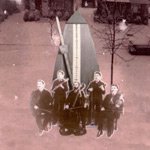Nine years ago, Julian Koster -- most well-known for his indelible sounds in Neutral Milk Hotel -- released First Imaginary Symphony for Nomad as The Music Tapes. Recorded in closets and cupboards, the album represented a peculiar tailspin into a media-saturated, George Reeves fantasy world, an album so grainy and offbeat that it stuck out even among the already outlandish Elephant Six releases. Critics didn't quite know what to make of it. All Music called it a "warts-and-all record, giving equal time to successful and not-so successful musical experiments"; Almost Cool labeled it as "a big ball of pretension or a completely wacky and fun musical experiment"; and PopMatters said the album exhibited a "very fine line between creative genius and utter nonsense." Meanwhile, Pitchfork called it "that overwrought beast nobody has been waiting for" and "the zenith of artistic onanism and sonic wankery."
It's interesting then that, in the nine years since its release, The Music Tapes' popularity has only experienced growth, garnering a rabid fanbase that borders on the cultish. Perhaps it was because Koster wasn't as much on the fringe of the E6 collective as in the heart of its experimental aspirations. He was right alongside Jeff Mangum petitioning for more distortion and more noise on In the Aeroplane Over the Sea, while his masterful strokes in The Elephant Six Orchestra and particularly Major Organ & The Adding Machine (that oh-so-mysterious experimental pop/musique concrete configuration) were slopped on with a brush drenched in beards of tape-collage alchemy and psychedelic snouts, sounds that have increasingly come to articulate the more bizarre dimensions of Elephant Six.
Similarly weird are his live sets, which feature his own musical inventions -- The 7 Foot Tall Metronome, Orbiting Human Circus Tapdancing Machine, The Clapping Hands Machine, etc. -- playing with him onstage. During "Freeing Song by Reindeer," for example, Koster balances what looks like a keyboard/jack-in-the-box hybrid on top of his head and cranks its handle counter-clockwise, which causes two cartoonish "hands" to repeatedly plop on the keys. Meanwhile, the adorable Static The Television takes lead vocals on "An Orchestration's Overture," as its inventor aggressively strums the banjo as if it were an electric guitar. Most recently, The Music Tapes played Athens Popfest 2008, in which he had some 300 people join him in a kazoo parade after his set to a nearby field, where everyone was blindfolded and ran around the dark chasing someone with a bell.
Indeed, the primary difference between these experiments and those of, say, noise and drone practitioners is that Koster's ultimate aim is inclusiveness. This isn't about "authenticity" or some silly "forward-thinking" construct. It's about indulging in escapism without assuming that diversion is inherently negative, or that transparency is undesirable, or that critiques of hyperreality are not without their own irony. It's about having faith in fantasy. His music is an invite to an alternate reality, one that is as unique as it is charming. Perhaps the most appropriate example are his "secret" outdoor shows — sort of like a Fluxus happening — for which he posts cryptic messages on his website revealing the location, date, time, and instructions. Those fortunate enough to make it to these one-off gigs are asked to keep details vague, perhaps to preserve the sanctity of the moment (or for reasons only the participants will ever know). All I could find out is that one of the events featured paper sailor hats, acorns, and a singing saw.
Thankfully, Koster's singular swipes persist throughout the highly anticipated follow-up, Music Tapes for Clouds and Tornadoes. It's not surprising, because many of these songs date back to before 2000, with some appearing on 2002's 2nd Imaginary Symphony For Cloudmaking (a 65-minute story album with artist Brian Dewan about a boy named "Nigh," presumably after Jeff Nigh Mangum). The new album doesn't reach the overt weirdness of its predecessor or Major Organ, but like those albums and In the Aeroplane, it revels in a soundworld that's entirely its own. Captured with a vast array of equipment (1930s Webster Chicago wire recorder, 1930s RCA ribbon microphone, 1960s Ampex 4-track, Hi-8 video camera, Dictaphone, computer, etc.), the album seems to intentionally project its colorful instrumentation in black and white, forcing listeners to confront their relationship with sound quality and how it might influence their tastes. Indeed, while the production suffocates the album's massive emotional and dynamic scope, sound quality pushed to these limits becomes something else entirely. Similar to a Daniel Johnston cassette or a Joe Tex 7-inch, the quality itself becomes aestheticized, like its own instrument.
Present again are the singing saw and bowed banjo, Koster requisites, sparingly embellished with everything from accordion, piano, tape organ, and drums to the euphonium, trumpet, flugelhorn, clarinet, and strings. In addition to Robby Cucchiaro and Eric Harris (who have contributed greatly to The Music Tapes in the past), the music is fleshed out by E6 regulars like Jeremy Barnes and Scott Spillane of Neutral Milk Hotel, Laura Carter of Elf Power, Will Cullen Hart of The Olivia Tremor Control/Circulatory System, and Kevin Barnes from of Montreal. Inventions like The 7 Foot Tall Metronome, the Singing Saw Choir, and The Clapping Hands help too. Yet nothing sounds cluttered. In fact, departing slightly from the sometimes spastic, collage approach of First Imaginary Symphony for Nomad, tracks like "Freeing Song for Reindeer," "Manifest Destiny," and "Tornado Longing for Freedom" allow for Koster's bare, nakedly sublime expressionism to take the forefront.
With lyrics like "Never before did we worry about you/ Now we are sure that there is cause for alarm" ("Freeing Song for Reindeer") and "Tornado cries, ‘Run for your lives!’ My tired wind's lonely and longing for freedom from storming" ("Tornado Longing for Freedom"), the album could be described as ominous if it weren't for the heartfelt delivery. There's also a lingering despair to the lyrics, but it's delivered with flashes of unabashed lyrical humanism and optimism. "‘Sail,’ said the seas/ The wind never sins/ Where its circumference on axis spins… How in the world can you say the world is a sad place?" he pleads on "The Minister of Longitude." Koster celebrates contentedness and rumination as much as he conjures longing and search, with most of the lyrics dealing with nature, as if its manifestations were actually sentient (and therefore held accountable for their actions), as if his strident yearnings could possibly synthesize the album's nature/non-nature dialectic.
Elsewhere, Koster resurrects the commanding, dominating vocal performance of Mangum on "Manifest Destiny," singing, "And you're mother/ And you're father/ And you're sister/ And you are bro — ther!!" Here he stretches his vocal chords so thin you imagine them as rubber bands, flinging off into infinity, dimpling the spacetime continuum. His head is obviously pointed skyward on "Saw Ping Pong And Orchestra," shouting "Nimbus, stratus, cirrus!!" with such urgency that you'd swear the opening ping pong ball samples had coalesced into a brilliant celestial sphere. In fact, melodies are so elongated, so disjointed that their forms reflect the occasional surrealism of his lyrics ("Ride the elves' cloven hoofed horsey, and find there's a symphony dreaming of you"). Heavy breaths are taken just to finish lines, choruses start early, verses are lopsided; everything sounds in perpetual transition, yet it all feels complete. And the subtlety! When the horns and strings come and go on "Songs for Oceans Falling," all I can envision is a warm, pulsating glow, dissipating with the kind of modest send-off one would expect from such tasteful employment.
Music Tapes for Clouds and Tornadoes isn't your typical album. Not only is it an idiosyncratic release for Merge, but it's an anomaly for independent music. What the album emphasizes is its own mythology, one that simultaneously gives voice to the singing saw and the banjo, letting their sound colors join the more traditional rock instruments in a recontextualization process that not only retains faith in the romanticism of Western tonality, but also embraces it. In fact, The Music Tapes celebrate many of the illusions deconstructionists pierce holes through, yet that won't stop fans from paying over $125 for a CD-R copy of the long out-of-print 2nd Imaginary Symphony For Cloudmaking. Indeed, this album is an aesthetic expansion that is decidedly upfront and human, seeped in tradition, and with a vision that's seen all the way through -- it even comes with a make-your-own pop-up construction! With Koster's curious inventions, unprecedented happenings, risky production techniques, stylistic inventiveness, and lyrical dexterity, this album comes truly out of leftfield. For having now only released two official albums, this is quite an accomplishment. According to Koster:
I just find the imaginary more real than the physical. Magic, the way we find things beautiful, the light behind eyes, kindness, and how we want to serve and protect the things we care about — these things seem like the real foundation of the world to me. I hope that the songs on this record can be more than just postcards from a world, but an invitation to it, to anyone at all who may find such a place comforting and nice.
Unless you're already a Music Tapes fan, chances are you haven't experienced anything quite as exquisitely raw, effortlessly transportive, and charmingly distinct in a long time.
1. Saw Ping Pong And Orchestra
2. Schedrevka
3. Freeing Song for Reindeer
4. Majesty
5. Nimbus Stratus Cirrus (Mr. Piano's Majesty)
6. Freeing Song by Reindeer
7. Tornado Longing for Freedom
8. Songs for Oceans Falling
9. Kolyada #1
10. The Minister of Longitude
11. Manifest Destiny
12. Kolyada #2
13. Cumulonimbus (Magnetic Tape for Clouds)
14. Julian and Grandpa
15. In an Ice Palace
More about: The Music Tapes




